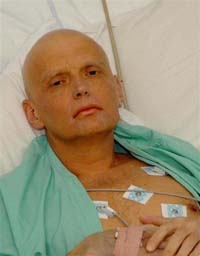Russian spy agency denies involvement in Litvinenko poisoning
Russia's foreign intelligence service on Wednesday denied involvement in the poisoning of Alexander Litvinenko, a fierce Kremlin critic and former spy who fell seriously ill in Britain, the Interfax news agency reported.

Litvinenko is in a London hospital under armed guard after what his associates claim was an assassination attempt by the Russian government. Doctors say he clearly was poisoned, but the substance used has not been identified.
"Litvinenko is not the kind of person for whose sake we would spoil bilateral relations," Interfax quoted Sergei Ivanov, a spokesman for the Foreign Intelligence Service, as saying. "It is absolutely not in our interests to be engaged in such activity."
The service, whose Russian abbreviation is SVR, declined comment to The Associated Press.
The SVR is one of the successor agencies to the Soviet KGB. Litvinenko worked both for the KGB and for another successor, the Federal Security Service. In 1998, he publicly accused his superiors of ordering him to kill tycoon Boris Berezovsky and a year later spent nine months in jail on charges of abuse of office, of which he was later acquitted.
He fled to Britain in November 2000, and three years later wrote a book accusing the FSB of staging apartment-house bombings that authorities blamed on Chechen separatists.
Litvinenko became ill shortly after he met with an Italian security expert, who said he had shown Litvinenko E-mails from a confidential source identifying the killers of journalist Anna Politkovskaya, a strong critic of the Kremlin who was gunned down in Moscow in October.
Doctors initially said that Litvinenko, 43, appeared to have ingested the toxic metal thallium, but the hospital where he is in intensive care said Tuesday that says that tests show thallium poisoning was unlikely. He has suffered damage to the immune system and to vital organs, as well as hair loss.
The hospital said that while preliminary tests suggested Litvinenko had not been poisoned by thallium salt the most common form of the toxin radioactive thallium remained a possibility.
Radioactive thallium is commonly used in hospitals, injected into the bloodstream to act as a tracer during heart scans, reports AP.
London's Metropolitan Police, whose anti-terrorist unit is leading the investigation into Litvinenko's poisoning, said in a statement that they were continuing to piece together his movements on Nov. 1, the day he became ill. The force refused to speculate on the cause of his illness.
Subscribe to Pravda.Ru Telegram channel, Facebook, RSS!





